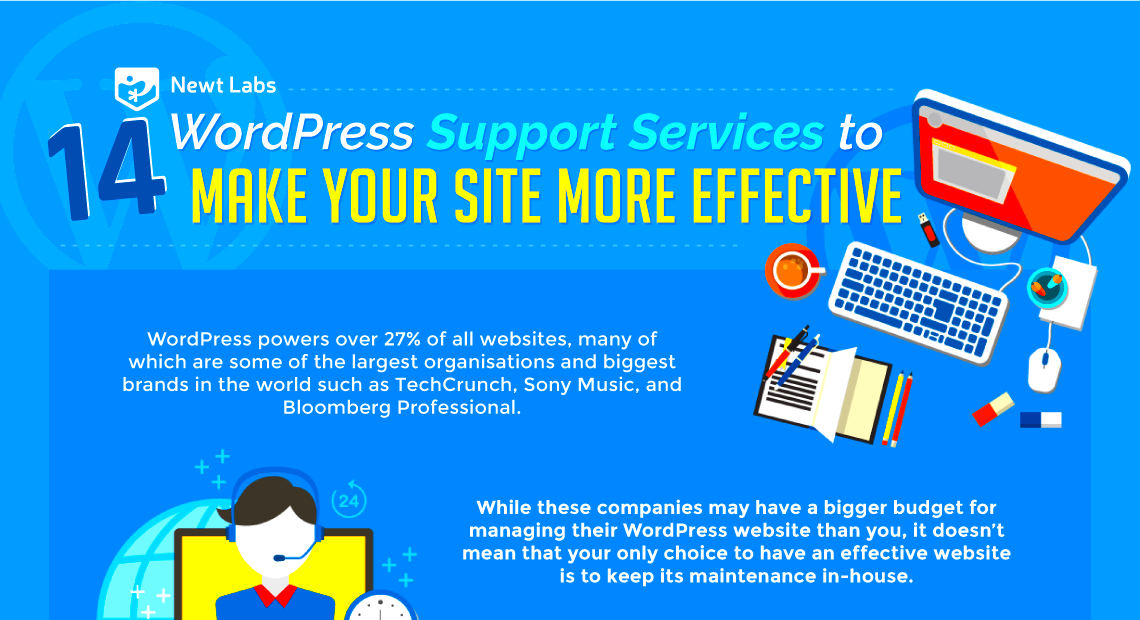If you’re diving into the world of WordPress, you may soon realize that while it’s a fantastic platform, it can sometimes leave you scratching your head. Whether you’re a complete newbie or a seasoned web developer, having access to the right support is crucial. WordPress support encompasses various types of assistance that help users troubleshoot and optimize their sites. So, if you’re feeling a bit lost or overwhelmed, don’t worry! There are plenty of resources and professionals ready to guide you on your
Types of WordPress Support Available

When it comes to finding the right support for your WordPress site, there are several avenues you can explore. Each type of support has its unique advantages, and understanding them can help you decide what’s best for your needs. Here are the primary options:
- Community Support:
This is often the first stop for many users. The WordPress community is incredibly vast and welcoming, with forums like the WordPress Support Forums and platforms like Stack Overflow. Here, you can ask questions, share issues, and receive advice from other users.
- Documentation:
The official WordPress documentation is a goldmine of information. It covers everything from installation to advanced features, making it a great resource for DIY troubleshooting.
- Professional Support:
For those who need immediate assistance or specialized help, hiring a professional support service might be the way to go. This can include:
Type Description Consultants Experienced professionals who offer one-on-one support, helping with specific issues or consulting for long-term projects. Managed Hosting Support Many hosting providers offer dedicated support for WordPress issues as part of their services, ensuring your site runs smoothly. Support Plugins Plugins specifically designed to help with common issues can provide instant fixes and enhance your website functionalities. - Online Courses and Tutorials:
If you’re more of a self-starter, countless online courses and video tutorials can teach you the ins and outs of WordPress. Platforms like Udemy and Coursera have numerous affordable options.
With this variety of WordPress support options, you’ll surely find the right fit to solve your website challenges!
Identifying Your Support Needs
When it comes to WordPress support, one size definitely does not fit all. It’s essential to take a moment and really think about what you need to keep your site running smoothly. This is the first step in ensuring you get the help that’s right for you.
Here are some questions to consider:
- What type of issues do you face regularly? Are you dealing with performance issues, security concerns, or maybe design tweaks?
- Do you want ongoing support or just occasional help? Some people need someone on standby while others just need help on an as-needed basis.
- Are you comfortable managing basic updates yourself? If you are, you may only need help with more complex issues.
- Is your site e-commerce-focused? If so, you may need specialized support for payment gateways, inventory management, and customer transactions.
Once you’ve answered these questions, you can create a list of your top priority support needs. This will come in handy when you start looking for the right support. It’s all about knowing what you need so you can match it with the right expert who can help.
Freelancers vs. Agencies: Which to Choose?
The decision between hiring a freelancer or a full-fledged agency can feel daunting. Both options have their pros and cons, and the best choice really depends on your individual requirements and preferences.
Freelancers often offer a more personalized, one-on-one experience. They usually work at a lower cost compared to agencies and can be very flexible in their availability. Additionally:
- Cost-Effective: You might save money since freelancers tend to have lower overhead costs.
- Individual Attention: You often get the chance to build a rapport and direct communication with a single person.
- Specialized Skills: Many freelancers have niche expertise which can be perfect for your specific needs.
On the flip side, working with an agency can be beneficial if you need a broad range of services:
- Team Expertise: Agencies often have a team of specialists, so you can tap into a wide array of skills and experiences.
- Dependability: If someone is unavailable, another team member can step in, ensuring you get the help you need without interruption.
- Comprehensive Solutions: Agencies can often manage multiple aspects of your site—from design to optimization—making your overall experience smoother.
Ultimately, the choice between a freelancer and an agency should align with your budget, specific requirements, and the level of ongoing support you anticipate needing. Weigh your options carefully, and you’ll be on your way to finding the right support for your WordPress site!
5. Popular WordPress Support Forums and Communities
If you’re navigating the sometimes choppy waters of WordPress, knowing where to find help is crucial. Thankfully, there’s a vibrant community of users and professionals who are more than willing to lend a hand. Let’s explore some of the most popular WordPress support forums and communities where you can get the guidance you need.
1. WordPress.org Support Forums: This is the official support forum where you can ask questions and receive help from community members. It’s a treasure trove of knowledge, featuring both general discussions and focused threads on specific issues. You can easily search existing topics to see if someone else has encountered and solved a similar problem.
2. Stack Exchange: WordPress Stack Exchange is a part of the larger Stack Exchange network, focusing on technical queries around WordPress. It’s a great place to ask specific questions and receive expert responses from seasoned developers. Be sure to follow their posting guidelines to get the best answers.
3. Facebook Groups: There are numerous Facebook groups dedicated to WordPress Support. Here, you can interact with other users, share experiences, and ask for advice. Popular groups include “WordPress Help and Share” and “WP Reddit.”
4. Reddit: The /r/WordPress subreddit is a lively platform where users share advice, resources, and troubleshooting tips. You can tap into the collective knowledge of both casual users and professional developers.
5. Meetups and WordCamps: In addition to online forums, local meetups and WordCamps offer opportunities to get hands-on advice and connect with other WordPress enthusiasts. These events often feature expert speakers and workshops designed to improve your WordPress skills.
6. How to Evaluate Support Providers
Finding the right support provider for your WordPress site can feel like searching for a needle in a haystack. With countless options out there, it’s essential to know how to evaluate them effectively. Here’s a handy guide to help you assess potential support providers and make an informed decision.
1. Check Their Experience: Start by looking into the provider’s background. How long have they been offering support? Do they specialize in WordPress? Check for their credentials and past work. A seasoned provider will typically have a rich portfolio and testimonials from satisfied clients.
2. Read Reviews and Testimonials: Don’t just take their word for it. Look for reviews on platforms like Google, Trustpilot, or even within communities you frequent. Authentic feedback from other users can give you a clear picture of their reliability and effectiveness.
3. Response Time: A good support provider should be responsive. Check their average response time to queries. Can they provide urgent support when you need it? This is particularly important if you run a time-sensitive website.
4. Scope of Services: Understand the services on offer. Does the provider specialize in technical support, website design, or maybe SEO? Be certain their expertise aligns with your specific needs.
5. Trial Period: Many support providers offer a trial period or a money-back guarantee. This is an excellent opportunity for you to evaluate their service without a significant commitment. Make the most of this phase to assess their efficiency and compatibility with your needs.
In summary, by taking the time to evaluate these factors, you can choose a support provider that fits your needs perfectly and keeps your WordPress site running smoothly.
7. Utilizing WordPress Documentation and Resources
When it comes to resolving issues on your WordPress site, the first place you should turn to is the extensive WordPress documentation available online. The WordPress community is vast and full of resources, so there’s a good chance that someone has faced the same issue you’re grappling with right now. Here’s how you can make the most of those resources:
- WordPress Codex: This is the official documentation for WordPress. Think of it as your go-to manual. Whether you’re looking for information on themes, plugins, or core functions, you’ll likely find it here. The WordPress Codex has guides for users of all levels.
- WordPress Forums: The WordPress Support Forums are filled with experienced users who are keen to help. You can post your questions there and often find responses within hours.
- WPBeginner: This is an excellent site with tons of tutorials and guides specifically aimed at beginners. They break down complex topics into easy-to-understand articles.
- YouTube: Sometimes, visual instructions are more effective. Searching for WordPress-related videos can provide step-by-step guidance that can help you resolve issues quickly.
- Blogs and Tutorials: Blogs like WP Tavern and other popular WordPress-related sites often have in-depth guides and articles on the latest trends, best practices, and troubleshooting.
So, rather than panicking at the first sign of trouble, take a breath and lean on the wealth of WordPress documentation and community support out there. You might be surprised at how easily you can find the answers you need!
8. Cost Considerations for WordPress Support
When you run into trouble with your WordPress site, one of the first things that comes to mind is the cost of support. The beautiful thing about WordPress is that it offers various options for assistance, often accommodating different budgets. Here’s a breakdown of some key considerations regarding costs:
- Free Resources: As mentioned earlier, there are numerous free resources available, such as the Codex, forums, and online tutorials. If your issue isn’t too complex, you may find a solution without spending a dime.
- Paid Support Services: If you’re faced with a more significant problem or don’t have the time to troubleshoot yourself, considering paid support options can be wise. Services like WP Site Care or WP Curve charge a monthly fee that can range from $30 to $300, depending on the level of support you require.
- Freelancers vs. Agencies: Hiring a freelancer to fix specific issues can be cost-effective, often charging between $20 and $100 an hour. Alternatively, agencies generally provide a broader range of services but might charge a premium for their expertise.
- Website Maintenance Plans: Many companies offer comprehensive plans that include regular backups, updates, and troubleshooting for a monthly fee, typically between $50 and $150. This can save you money in the long run by keeping your site running smoothly.
- Licensing Fees: If you’re using premium themes or plugins, don’t forget to account for their annual renewal fees, which can impact your overall budget.
In summary, evaluating your specific needs and weighing the available options will help ensure that you invest wisely in WordPress support, tailored to both your site’s requirements and your budget!
Conclusion: Empowering Your WordPress Journey
WordPress is an incredibly powerful platform that allows users to create stunning and functional websites. However, navigating the complexities of managing a website can sometimes be overwhelming. Understanding how to seek help effectively is crucial in maintaining and enhancing your site’s performance.
Here are some key avenues for finding the right support for your WordPress site:
- Official WordPress Support: The official WordPress support forums are a great first stop for any questions or issues.
- Hosting Provider Support: Many hosting companies offer specialized WordPress support, helping you with server-side issues.
- WordPress Communities: Engage with communities on platforms like Reddit, Facebook groups, or specialized forums where enthusiasts share insights.
- Freelancers and Agencies: For more complex needs, hiring a WordPress expert can save time and ensure quality results.
- Online Courses and Tutorials: Websites like Udemy, Coursera, and WordPress-specific blogs can provide in-depth knowledge and troubleshooting tips.
Additionally, consider creating a table to compare different support options:
| Support Option | Cost | Response Time |
|---|---|---|
| Official WordPress Support | Free | Variable |
| Hosting Provider Support | Often included | Quick |
| Freelancers/Agencies | Varies | Depends on agreement |
By being proactive and knowing where to find help, you can empower your WordPress journey and ensure a smoother, more enjoyable experience.



